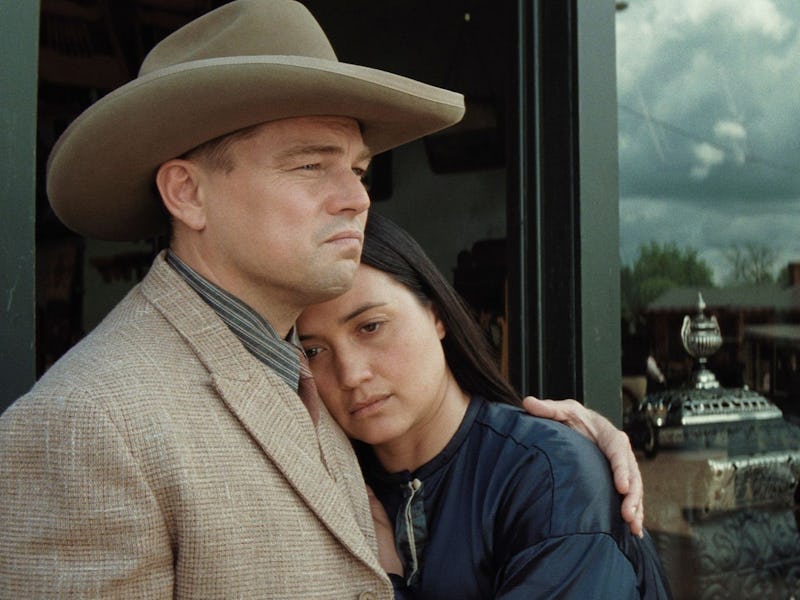With Killers of the Flower Moon’s Meta Ending, Scorsese Breaks Reality — And the Audience
“There was no mention of the murders.”

Killers of the Flower Moon is a beautiful, harrowing film. In terms of sheer craftsmanship and technical artistry, there have been no movies more impressive than it this year. While its depiction of the Native American murders at the center of its story has been and will continue to be discussed and debated as well, there are very few movies this year that feel as if they were made with as much thought and care. Killers of the Flower Moon is, above all else, a deeply thoughtful, contemplative film.
Nowhere is that clearer than in its epilogue, which chooses to communicate the fallout of its story in the form of an over-the-top true-crime radio show. The details of William King Hale’s (Robert De Niro) arrest and later release; Ernest Burkhart’s (Leonardo DiCaprio) eventual pardon; and Mollie Kyle’s (Lily Gladstone) death all come accompanied by analog sound effects and performative readings of news reports. The sequence is entrancing and horrifying, and it eventually becomes breathtaking.
It reaches its artistic pinnacle when Mollie’s final years are detailed by none other than Martin Scorsese himself, who steps out from behind the camera and into the spotlight to note that Mollie’s obituary made no mention of the orchestrated murders of her family members. This moment, one of the most shocking and extraordinary of any you’ll see in a movie this year, makes the painful reality of not only Killers of the Flower Moon’s story but also the existence of the film itself hauntingly clear.
In Killers of the Flower Moon’s final act, Martin Scorsese assumes full responsibility for his creative decisions.
Killers of the Flower Moon’s radio show epilogue serves multiple purposes. On the one hand, it illustrates just how the American government used its investigators’ solving of the film’s central murders as a way to further bolster its reputation and might. By turning its horrifying story of systemic racism and greed into a frivolous, ad-ridden radio play, Killers of the Flower Moon also acknowledges how America has made a habit out of transforming even the greatest examples of its sins and inadequacies into forms of entertainment and, therefore, vessels for profit.
The film’s final reveal that Mollie Kyle’s obituary neglected to mention the tragedies that marred her life and the lives of so many of her fellow Osage, meanwhile, allows it one last chance to return to one of its biggest ideas. Through characters like DiCaprio’s Ernest, Killers of the Flower Moon explores how a failure to acknowledge one’s bigotry, sins, and lies can lead to untold havoc and destruction. With its reading of Mollie’s obituary, the film reveals how America itself has, like Ernest, repeatedly refused to engage in any form of introspection.
And then there’s the fact that this final piece of information comes courtesy of Scorsese himself, a filmmaker who holds an unrivaled place within the world of cinema. No other director alive thinks as deeply about the power of films and the role he plays in their creation. By inserting himself into Killers of the Flower Moon’s epilogue, Scorsese acknowledges his own shortcomings, as well as those of the film he’s made. The mere act of making Killers of the Flower Moon means that Scorsese has, in effect, participated in the same entertainment-ification of tragedy that he’s trying to spotlight... and he’s keenly aware of that.
Killers of the Flower Moon goes out on a fourth-wall-breaking, elegiac final note.
In the film’s closing moments, Scorsese accepts responsibility for his complicity in the narrativization of American history and tries to pay final respects to the Osage. It’s a cinematic masterstroke — a denouement that sends Killers of the Flower Moon out on a fittingly mournful note and argues that its inherent, inevitable shortcomings may say just as much about history as anything else in the film.
Then, as one last apology, Scorsese ends Killers of the Flower Moon by returning its story to the Osage Nation. The film cuts away from its climactic radio show to an overhead shot of a 21st-century Osage gathering. Scorsese, in other words, concludes Killers of the Flower Moon by both placing its story back within its wider historical context and reiterating that the Osage have, indeed, survived the countless atrocities committed against them.
It’s a quiet, affecting conclusion to one of the year’s best films.